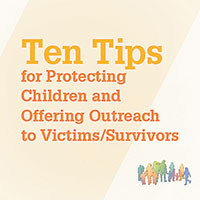 1 . Sexual abuse is about the victim.
1 . Sexual abuse is about the victim.
Many people are affected by abuse but the individual most impacted is the victim who has suffered a violation of trust that can affect his or her entire life.
2. The residual effects of having been abused can last a lifetime.
The sense of violation goes deep into a person’s psyche and feelings of anger, shame, hurt and betrayal can build long after the abuse has taken place. Those who have been abused can heal, but it often takes time, therapy and the support of loved ones.
3. No one has the right to have access to children.
No one, no matter who they are, has an automatic right to be around children or young people who are in the care of the Church without proper screening and without following the rules.
4. Common sense is not all that common.
Dioceses, schools, parishes and especially families must educate themselves and others on how to protect children.
5. Child sexual abuse can be prevented.
It is critical to build safety barriers around children and young people to keep them from harm – such as protective guardians, codes of conduct, background evaluations, policies and procedures, and safety training programs.
6. Feeling heard leads toward healing.
Relief from hurt and anger often comes when one feels heard, when one’s pain and concerns are taken seriously, and a victim/survivor’s suffering, pain and anger are acknowledged.
7. You cannot always predict who will be an abuser.
Experience shows that most abuse is committed by someone who has gained the trust of a victim/survivor and his/her family.
8. There are behavioral warning signs of child abusers.
Some abusers isolate a potential victim by giving him or her undue attention or lavish gifts. Others allow young people to participate in activities which their parents or guardians would not approve, such as watching pornography, drinking alcohol, using drugs and excessive touching, such as wrestling and tickling.
9. People can be taught to identify grooming behavior.
Grooming behaviors are the actions which abusers take to project the image that they are kind, generous, caring people, while their intent is to lure a minor into an inappropriate relationship. Offenders can be patient and may groom their victim, his or her family, or community for years.
10. Background checks are important.
Background checks in churches, schools and other organizations keep predators away from children both because they scare off some predators and because they uncover past actions that should ban an adult from working or volunteering with children.
— U.S. Conference of Catholic Bishops


